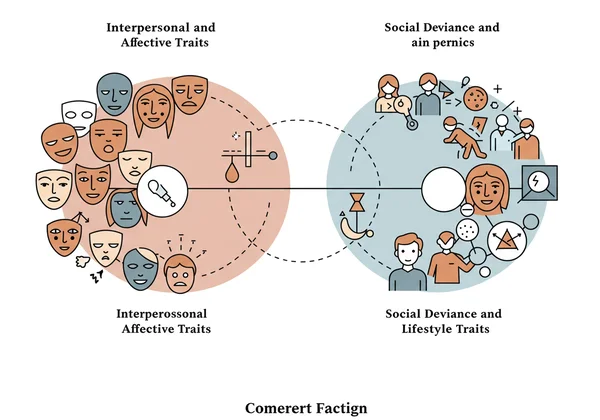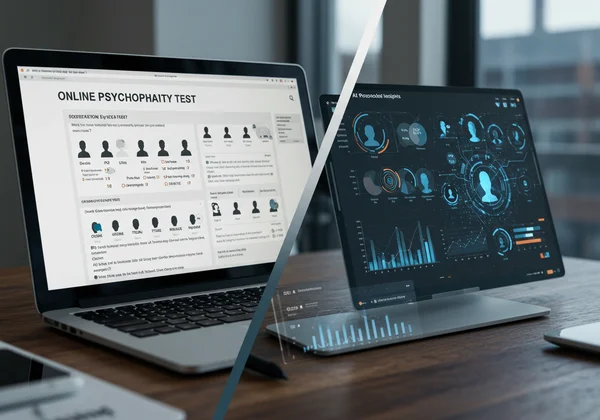Psychopathy Test & AI Insights: Understanding the Hare PCL-R Gold Standard
To truly grasp the intricate world of psychopathy, a deep dive into its "gold standard" assessment tool is essential: the Hare Psychopathy Checklist-Revised (PCL-R). Many people wonder, How do I know if I'm a psychopath? While a definitive answer requires comprehensive clinical evaluation, understanding the benchmark tool used by experts is a crucial first step. While professional instruments like the PCL-R are for clinical use only, accessible online screeners can offer valuable preliminary insights. For those curious about their own traits, a confidential psychopathy test can be an informative starting point.
This guide offers clear, scientifically-backed insights for students, professionals, and anyone seeking to understand the complexities of personality assessment. It will demystify the PCL-R, explaining what it is, how it works, and how it differs from the self-assessment tools available online.
What is the Hare PCL-R Test?
The Hare PCL-R is not a simple questionnaire you can take online. It is a sophisticated clinical rating scale used by trained professionals to assess the presence of psychopathic traits in individuals, primarily in forensic or clinical settings. It involves a detailed review of a person's life history and a semi-structured interview, making it the most comprehensive tool for this purpose. Developed from decades of research, it provides a dimensional score rather than a simple "yes" or "no" diagnosis.
Robert Hare's Pioneering Role in Psychopathy Research
To understand the PCL-R, one must know its creator, Dr. Robert Hare. A Canadian criminal psychologist, Hare dedicated his career to studying psychopathy, transforming it from a vague concept into a measurable construct. His work, beginning in the 1970s, culminated in the PCL-R, which gave researchers and clinicians a common language and a reliable method to identify psychopathic traits. His research has been foundational, shaping our modern understanding of the personality disorder.

A Brief History & Evolution of Psychopathy Assessment Tools
Before Dr. Hare, assessing psychopathy was inconsistent. Early concepts were broad and often confused with sociopathy or general antisocial behavior. The development of the PCL-R, and its subsequent revisions, marked a significant leap forward. It created a standardized framework grounded in empirical evidence. This set the stage for other instruments, including self-report measures like the Levenson Self-Report Psychopathy Scale, which are designed for research and non-clinical populations, much like the educational tools used in an online psychopathy test.
Components & Scoring: Deconstructing the PCL-R
The PCL-R consists of 20 items, each scored on a three-point scale (0 = item does not apply, 1 = item applies somewhat, 2 = item definitely applies) by a clinician. The total score, ranging from 0 to 40, indicates where an individual falls on the psychopathy spectrum. These 20 items are grouped into two main factors, which capture the core components of the psychopathic personality.

Factor 1: Interpersonal and Affective Traits Explained
This factor is often considered the core of the psychopathic personality. It encompasses the emotional and interpersonal deficits that define the construct. These traits are internal and reflect a person's character and inner world.
Key traits include:
- Glibness and superficial charm
- Grandiose sense of self-worth
- Pathological lying
- Cunning and manipulativeness
- Lack of remorse or guilt
- Shallow affect (emotional poverty)
- Callousness and lack of empathy
Factor 2: Social Deviance and Lifestyle Traits Unpacked
This factor relates to an individual's unstable and antisocial lifestyle. These traits are more behavioral and are often the most visible signs to others. They reflect a chronically unstable and socially deviant way of life.
Key traits include:
- Need for stimulation or proneness to boredom
- Parasitic lifestyle
- Poor behavioral controls
- Early behavior problems
- Impulsivity
- Irresponsibility
- Juvenile delinquency and criminal versatility
The Clinical Scoring Process: Administering the PCL-R
Administering the PCL-R is a meticulous process that requires extensive training and clinical judgment. A qualified professional conducts a detailed interview covering the individual's entire life—from childhood to present day. Crucially, they also perform a collateral file review, examining official records like school, police, and employment files to verify the information. This cross-verification is vital for an accurate PCLR test score and highlights why it cannot be a self-administered test.

Why the PCL-R Remains the Gold Standard for Psychopathy
For decades, the Hare PCL-R has been the dominant instrument in its field. Its widespread use in research and clinical practice is due to its strong scientific foundation. It is recognized for its ability to predict future violence and recidivism, making it an invaluable tool in the criminal justice system.
Reliability, Validity, and Empirical Support
The strength of the PCL-R lies in its psychometric properties. Numerous independent studies have confirmed its high reliability (consistency of results) and validity (accuracy in measuring what it's supposed to measure). This robust empirical support is why it has earned the "gold standard" title. It provides a reliable framework that helps professionals make informed decisions in high-stakes environments.
Limitations and Ethical Considerations in PCL-R Use
Despite its strengths, the PCL-R is not without limitations. Experts acknowledge the potential for misuse if administered by untrained individuals. A high score on the PCL-R can have significant real-world consequences, such as longer prison sentences, so ethical use is paramount. Furthermore, discussions continue regarding potential cultural biases and its applicability across different populations. This underscores the importance of using it responsibly as part of a comprehensive psychological assessment.
PCL-R vs. Online Psychopathy Screeners: Understanding the Difference
It is crucial to distinguish between a clinical tool like the PCL-R and the online psychopathy test you might find on the internet. They serve fundamentally different purposes. One is a diagnostic aid for clinicians, while the other is an educational tool for self-exploration.
Depth of Clinical Interview vs. Self-Report Questionnaires
The PCL-R's accuracy comes from its two-part method: the interview and the file review. A clinician objectively assesses a person's entire life history. In contrast, online self-report questionnaires rely entirely on your own honesty and self-awareness. They are designed to be accessible and provide a preliminary glimpse into personality traits, not a clinical score. A free psychopathy test can be an excellent first step for self-reflection, but its results are for educational purposes only.
The Role of Our AI-Powered Insights
This is where our platform fits in. Our scientifically-inspired test is designed as an educational and informational tool. It helps you explore traits associated with the psychopathy spectrum in a safe, confidential, and accessible way. After completing the initial questionnaire, you receive a summary score.
What sets our platform apart is the optional AI-Personalized Report. This report moves beyond a simple number, offering deep, individualized insights into your personality profile. It highlights potential strengths and challenges associated with your traits and explores their impact on daily life, providing actionable advice for personal growth. It bridges the gap between simple online quizzes and dense clinical literature.

Deepening Your Understanding of Psychopathy Traits
Understanding the Hare PCL-R offers invaluable context for anyone curious about psychopathy. It underscores the meticulous rigor of clinical assessment and illuminates the core traits that define this complex construct. While the PCL-R itself is strictly for professional use, your journey to self-understanding can thoughtfully begin with exploring your own personality.
Our scientifically-inspired online tool provides a private, no-pressure space for meaningful self-reflection. If you're ready to gain a deeper understanding of your unique traits, we invite you to take our free test today and discover how our personalized AI report can illuminate your path.
Frequently Asked Questions About Psychopathy Assessment
Can you really test for psychopathy accurately?
Yes, psychopathy can be assessed accurately by trained clinicians using comprehensive tools like the Hare PCL-R. These assessments involve much more than a simple questionnaire. For personal insight, online screeners can provide a valuable, though not clinical, indication of traits.
What are the primary signs of psychopathy measured by assessment tools?
Assessment tools generally measure two clusters of traits. The first includes interpersonal and emotional characteristics like a lack of empathy, manipulativeness, and a grandiose sense of self. The second cluster involves lifestyle and behavioral traits, such as impulsivity, irresponsibility, and antisocial behavior.
How do I know if I might have psychopathic traits?
The first step is honest self-reflection. If you have concerns, using a confidential educational tool can be a helpful starting point. The psychopathy spectrum test on our site is designed to provide preliminary insights for educational purposes. For serious concerns, consulting a qualified mental health professional is always the recommended course of action.